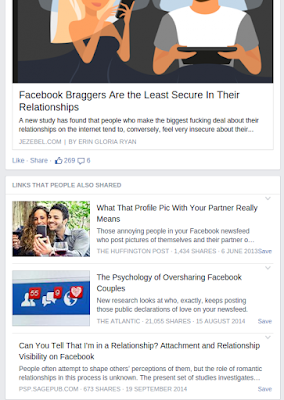New research proves that thing you agree with!
I'm assuming readers know what Facebook is (or, social media) - if you don't, this probably won't be interesting. For those that do, you may have recognized that when you click to read a shared article, underneath will appear similar articles you may also be interested in. The idea for this post came about after doing just that, and the following was the result:
It's probably trick to read at that size, so to summarize:
- The original link was a Jezebel article about research published in September 2014 in Personality and Social Psychology Bulletin, where they quote the abstract: "On a daily basis, when people felt more insecure about their partner's feelings, they tended to make their relationships visible".
- The first suggested link was from HuffPo about research published in July 2013 in Social Psychological and Personality Science. It doesn't quote the abstract but summarizes it, including how the study "found that participants were more likely to post information about their relationship on Facebook on days when they were feeling particularly satisfied with their marriage."
- The second suggested link was from The Atlantic about research presented at a 'Society for Personality and Social Psychology' conference in August 2014. It covers most aspects of the research link, including both that it "found that those satisfied with their relationship are more likely to use Facebook to post couple photos and details of their relationship" as well as finding "Individuals high in Relationship Contingent Self-Esteem (RCSE) are also more likely to post affectionate content."
- The last link is direct to the research in the first link. (yay! good to know people share this too).
I clicked the initial article hoping to read about the research methodology and precise results - e.g: how correlated is it? How many people were studied, and how was their insecurity classified? Unfortunately, all research above requires payment to view :( I might investigate that in the future, but for now, I - and presumably 99.99% of those reading the news articles - can only go on the abstracts.
 |
| Logo for http://www.spsp.org/ |
A few things surprised me - firstly, the bulletin/publication/conference is all run by the same group: the Society for Personality and Social Psychology (SPSP), who runs the conference and publishes both the bulletin (PSPB) and the journal (SPPS). I assume they're legit, and I guess there's just not much competition for publication in this field, but still, it is not what I had expected. What is more, the first two articles seem related - their published titles include "Can You Tell That I’m in a Relationship?" and "Can You See How Happy We Are?", and both include Amy Muise as a co-author.
On the research side, the first two articles have quite different conclusions, but when combined they say the same as #3 - that is, for the people posting more about their relationship: some are doing it because they're happier, and some are doing it because they're more anxious. My guess is you could research to find more correlations too: posting about your relationship is probably correlated to your level of facebook usage, your access to a camera phone, how much interest you take in your relationship vs other things you might post about, etc...
The first two news articles however only bring a one-sided approach - in particular #1, which doesn't mention the contrary research that #2 had previously covered. What is more - nowhere (other than hopefully in the published research, which the average person can't access) is there any mention of the strength of correlation. From my own anecdata, people often read stuff like article #1 and now think: "See, if you post about your relationship, you must be insecure! Science says it's true!" rather than "Hmm... so this means you're slightly more likely to have RCSE than someone who doesn't post as much, and there's a bunch of other reasons you might share that many photos."
That said, I know there's nothing new to the problems with science publications and journalism (this talk is great), so consider this just a rant/friendly reminder to avoid reading too much into what a journalist summarizes from a single study. Now, time to go back to reading even more articles before starting my degree...




Well, at least Facebook tries to offer a balanced perspective, by suggesting links to research on both sides :))))
ReplyDeleteI'm sooo glad that most of the Machine Learning and Computer Vision research is published in open access journals and that they publish preprints on ArXiV. Soon you should have access to all these psychology papers from University, right?
Oooh, good point. Not that useful for the general public reading the articles, but I guess being at Uni should make my access for them much better :)
DeleteThen there's also the "search for the article title with filetype:pdf" trick, although in this case that didn't turn up any results either.